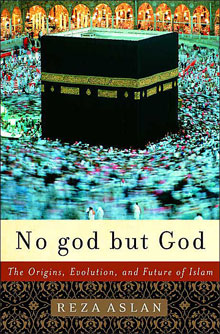Book Notes
 Reza Aslan, No god but God; The Origins, Evolution, and Future of Islam (New York: Random House, 2005), 310pp.
Reza Aslan, No god but God; The Origins, Evolution, and Future of Islam (New York: Random House, 2005), 310pp.
Reza Aslan was born in Iran but has lived most of his life in America, positioning him nicely to write this readable introduction to the history, practices, teachings, and contemporary challenges of Islam. But Aslan writes not just to inform; in his introduction he admits that "this book is, above all else, an argument for reform" in this "magnificent yet misunderstood faith." In his view, contemporary Islam is best understood not in terms of its ostensible conflict with the Christian west, but within its own widely competing visions of itself: "There is one thing that cannot be overemphasized: What is taking place now within the Muslim world is an internal conflict between Muslims, not an external battle between Islam and the West. The West is merely a bystander—an unwary yet complicit casualty of a rivalry that is raging in Islam over who will write the next chapter in its history" (p. 248). And if Islamic history looks and feels rather violent and bloody, just remember, says Aslan, that it took Christianity 1500 years to experience its own Reformation.
The more than one billion adherents of Islam (roughly one out of four people in the world), of course, are no more uniformly monolithic than Christians; think of the wide divergences in Catholic, Orthodox, Protestant and Pentecostal Christianity. Aslan begins with pre-Islamic Arabia and the life of Muhammad, with special emphasis on the prophet's radical reforms for social egalitarianism and economic justice, and covers the basics of Sunni or mainstream Islam. Individual chapters consider the nature of jihad, the five pillars of Islam, its two major sectarian movements—Shi'ism and Sufism, and the consequences for Islam of Western colonialism in Egypt and India (with consideration of the Wahhabist totalitarian state in Saudi Arabia). Throughout, whether considering the role of women, relationships with Jews and Christians, or the nature of the Quran, Aslan takes an optimistic and progressive stand. A chronology of key events, a glossary of key Arabic terms, and a considerable bibliography complement the book.
Can Islam and liberal democracy co-exist in the Middle East? "Not only can it do so, it must," insists Aslan (p. 253). Ironically, if not tragically, in his final chapter he uses his own home land of Iran as an encouraging example, but this was before the election of the hard-line Teheran mayor Mahmoud Ahmadinejad over former president Hashemi Rafsanjani as the new president of Iran in July 2005. Only the future will tell if Aslan is right.


